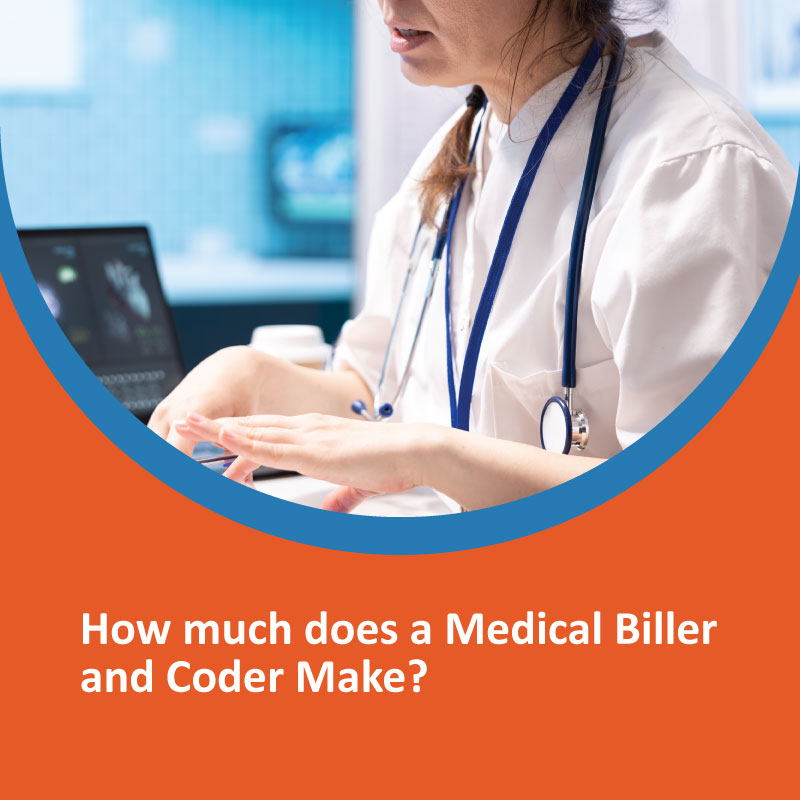If you’re interested in healthcare but don’t want to work directly with patients, medical billing and coding is a great career path. It’s a vital part of the healthcare system, and the pay can be quite competitive, especially if you gain the right certifications and experience.
So, how much does a medical biller and coder make? On average, a medical biller and coder in the U.S. earns between $45,000 to $55,000 per year. However, some earn much more depending on various factors like experience, certifications, and work location.
Let’s explore the salary ranges in more detail and how you can maximize your earnings in this field.
You may want to read: Can you go to Jail for not Paying Medical Bills
How much does a Medical Biller Earn?
Across the United States, the average annual salary for a medical biller and coder is around $48,000. This can translate to roughly $23 per hour. However, these numbers are averages, and your actual salary may be higher or lower depending on your specific circumstances.
Here’s a general breakdown by career stage:
| Experience Level | Estimated Annual Salary |
| Entry-Level | $35,000 – $42,000 |
| Mid-Level | $45,000 – $55,000 |
| Experienced | $60,000 – $70,000 |
| Top Earners | $75,000+ |
Certified professionals and those working in hospitals or specialized clinics tend to earn more than beginners or those working in smaller private offices.
What Factors Affect a Medical Biller and Coder’s Salary?
Multiple factors influence how much a medical biller and coder makes. Let’s look at each one in detail.
1. Location
Location plays a big role in salary. Coders in large urban cities or high-cost-of-living areas usually make more than those in rural towns.
For example:
- California, New York, and Massachusetts often offer salaries above $60,000.
- Southern and Midwest states might offer salaries closer to $40,000–$50,000, but the cost of living is usually lower.
Remote coding positions, which have grown significantly since the pandemic, may allow you to earn higher salaries while living in lower-cost areas.
2. Workplace Setting
Where you work matters. Different employers pay different rates.
- Hospitals and outpatient care centers generally offer higher pay due to the complexity and volume of cases.
- Private practices or physician offices may offer lower pay but might provide better work-life balance.
- Insurance companies and government agencies also employ coders, often with competitive benefits.
3. Certifications
If you’re wondering how to increase your salary, certifications are the key.
Some of the most recognized certifications include:
- CPC (Certified Professional Coder) – offered by AAPC
- CCS (Certified Coding Specialist) – offered by AHIMA
- CBCS (Certified Billing and Coding Specialist) – offered by NHA
Coders with certifications can earn 15–25% more than those without. In fact, top earners in this profession usually have at least one certification.
4. Years of Experience
The more experienced you are, the more you’ll earn. Many organizations offer raises, bonuses, and promotions to coders who consistently perform well.
- 1–2 years of experience: $35,000 to $45,000
- 3–5 years: $50,000 to $60,000
- 5+ years: $60,000 and up
Seasoned coders may also take on supervisory or auditing roles, which come with higher pay.
5. Specialization
If you specialize in a particular area of medicine, you could earn more. Common specialties include:
- Inpatient coding
- Emergency room coding
- Cardiology, oncology, or radiology coding
These areas often involve more complex codes and higher billing amounts, which means you’ll be trusted with more responsibility—and better pay.
How to Increase Your Salary as a Medical Biller and Coder
There are many ways to boost your income in this field. Here are a few practical tips.
1. Earn Industry Certifications
The fastest way to earn more is to get certified. AAPC and AHIMA certifications are well-respected and can help you stand out to employers.
For example:
- A CPC-certified coder makes on average $5,000 to $10,000 more annually than a non-certified coder.
2. Continue Your Education
Enroll in workshops, coding bootcamps, or online courses. Learn new software systems or stay up-to-date with changes to coding standards like ICD-10, CPT, and HCPCS.
3. Apply for Remote or Freelance Jobs
Many companies now offer remote coding jobs. Some even allow you to freelance for multiple clients, potentially increasing your income.
4. Gain Experience in High-Demand Specialties
Focus on medical fields that are always in demand. Emergency rooms, surgical centers, and cancer treatment centers require detailed coding and often pay higher wages.
5. Look for Leadership Roles
After a few years in the field, consider moving into roles like:
- Coding Supervisor
- Compliance Auditor
- Billing Manager
These positions typically come with higher salaries and benefits.
Job Outlook for Medical Billers and Coders
According to the U.S. Bureau of Labor Statistics (BLS), employment for medical records and health information specialists — including medical billers and coders — is expected to grow by 7% from 2022 to 2032. This is faster than the average for all occupations.
The main reasons for growth include:
- An aging population requiring more medical care
- Expansion of healthcare services
- Increased use of electronic health records (EHRs)
This means job security is strong, and opportunities are likely to increase in the coming years.
Conclusion
So, how much does a medical biller and coder make? The answer depends on several factors, but most professionals earn between $45,000 to $55,000 annually, with top performers making upwards of $75,000.
This is a stable and rewarding career with room to grow. By earning certifications, choosing the right work setting, and gaining experience, you can steadily increase your income over time.
Whether you’re just starting or looking to take your career to the next level, medical billing and coding offers a bright future with strong demand, flexibility, and competitive pay.
FAQs
Q1. What is the highest salary a medical biller and coder can make?
Top earners can make $75,000 or more, especially with advanced certifications and management roles.
Q2. Can I work from home as a medical biller and coder?
Yes. Many companies now offer remote positions, especially after the shift to digital health records.
Q3. Do I need a college degree for medical billing and coding?
No, a certification program or diploma from a training center is usually enough to start your career.
Q4. How long does it take to become a certified medical coder?
It usually takes 6 to 12 months to complete a certification program, depending on the course and schedule.
Q5. Is medical billing and coding a good long-term career?
Yes. With growing demand in healthcare, this profession offers job stability, good pay, and advancement opportunities.



